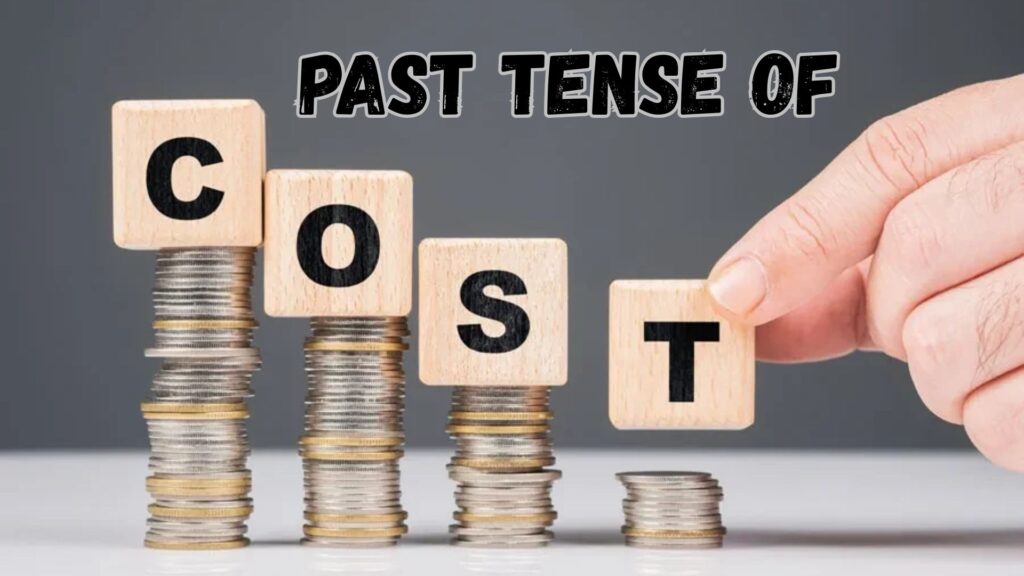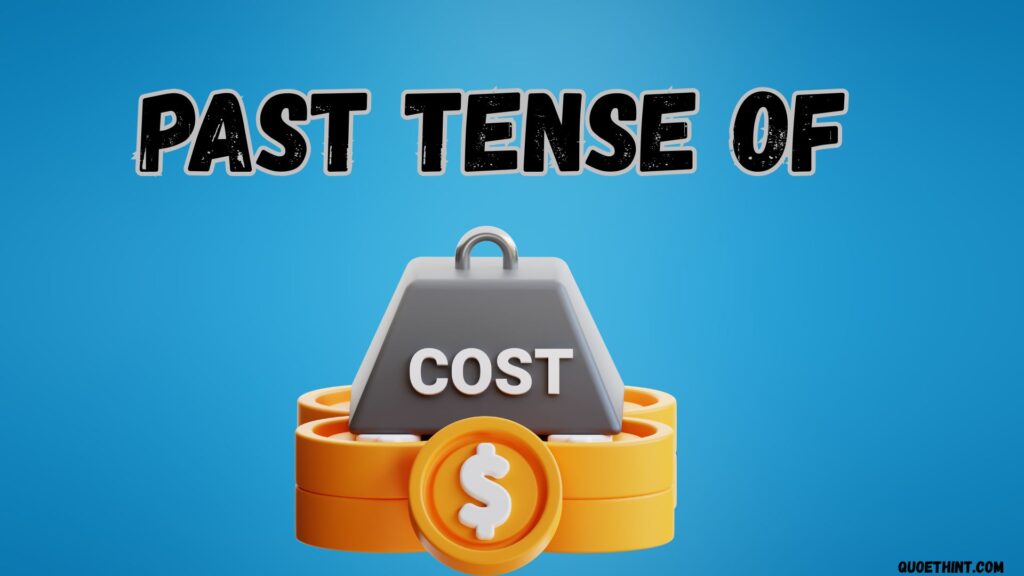English verbs can be confusing. Even a simple word like cost raises a question: What is the past tense of cost? Is it cost or costed? If you’ve been unsure, you’re not alone. Let’s break it down so you’ll never hesitate again.
The Quick Answer: Past Tense of Cost

The correct past tense of cost in most cases is cost, not costed. This is because cost is an irregular verb, just like cut or put it doesn’t add -ed in the past tense.
✅ Correct: The flight cost $800 last month.
❌ Incorrect: The flight costed $800 last month.
But wait costed isn’t always wrong. It has a very specific role, mostly in accounting terminology and project estimation. Let’s dive into both.
When to Use “Cost” in Past Tense
Whenever you refer to the actual price of something in the past, use cost. It doesn’t change form.
Examples
- The jacket cost $75 when I bought it.
- Their vacation to Italy cost a small fortune.
- That mistake cost me the job.
Here, the verb shows what you paid, not what you calculated.
Scenario Example: Email Using “Cost”
Subject: Expense Report for Client Dinner
Hi Emily,
The client dinner last night cost $450, including drinks and tax. I’ve attached the receipt for reimbursement.
Best regards,
David
This is natural and correct because it refers to the actual amount spent.
When “Costed” Is Correct
Now for the twist: costed exists and is correct when referring to calculating or estimating a price, not paying one. You’ll find this in financial analysis, budgeting, and professional jargon.
Examples
- The engineering team costed the new bridge project last quarter.
- The proposal was carefully costed before submission.
- We’ve costed the new software migration at $50,000.
Here, costed means “performed a costing process”, not the price itself.
Scenario Example: Professional Email Using “Costed”
Subject: Project Budget Estimation
Hi John,
We’ve costed the upcoming product launch at $250,000, which includes design, production, and marketing. Please review the breakdown attached.
Thanks,
Olivia
This sounds formal and professional perfect for business contexts.
Why Two Forms Exist
The dual usage comes from contextual grammar rules. Most verbs are either regular verbs (add -ed) or irregular verbs (don’t change), and cost is irregular. But when English needed a term for deliberate costing or estimation, professionals added costed to describe the process of pricing something, not the price itself.
Quick Comparison: Cost vs. Costed
| Context | Correct Form | Example |
|---|---|---|
| Talking about price paid | Cost | The car cost $30,000 last year. |
| Talking about estimating price | Costed | We costed the event before approval. |
Common Mistakes
- Using costed for purchases
❌ The tickets costed $200.
✅ The tickets cost $200. - Using cost for budgeting
❌ We cost the campaign last week.
✅ We costed the campaign last week. - Mixing contexts
Stick with cost for actual expense, costed for estimation.
Practical Examples in Different Contexts
- Yesterday’s lunch cost me $15. (Actual price)
- The finance team costed the expansion project at $2M. (Estimation)
- Her decision cost the company a major client. (Here, cost = caused a loss)
How to Remember the Difference
- Money already spent? Use “cost.”
- Just calculating? Use “costed.”
Easy rule, right?
Scenario Example: Social Media Post Using Both
“That vintage record player I bought last year? It cost me $300! Just had the upgrade costed it’s going to be pricey but worth it.”
Past Tense of Cost in Verb Conjugation
Here’s the complete verb conjugation for cost:
| Form | Example |
|---|---|
| Base form | cost |
| 3rd person singular | costs |
| Present participle | costing |
| Past tense | cost |
| Past participle | cost |
FAQs: Past Tense of Cost (Google Snippet Ready)

What is the past tense of cost?
The past tense of cost is cost when referring to the actual price paid.
Is costed ever correct?
Yes, costed is correct in technical contexts like budgeting or project estimation, meaning “calculated the cost.”
What is the past participle of cost?
The past participle of cost is also cost.
Why is cost an irregular verb?
Because it doesn’t follow the regular rule of adding -ed in past tense forms.
What’s the difference between cost and costed?
- Cost = actual price paid.
- Costed = process of estimating or calculating costs.
Final Thoughts
So, what’s the past tense of cost? For most situations, it’s cost. Use costed only when you’re talking about estimating costs in accounting or project planning.
Remember:
- Actual expense? Cost.
- Estimated expense? Costed.
Bugti is the founder of Quoethint.com, a hub for English language tips, writing advice, and grammar guidance. With years of experience in English studies and a passion for clear communication, Bugti created this platform to make grammar and writing easy to understand for everyone.
